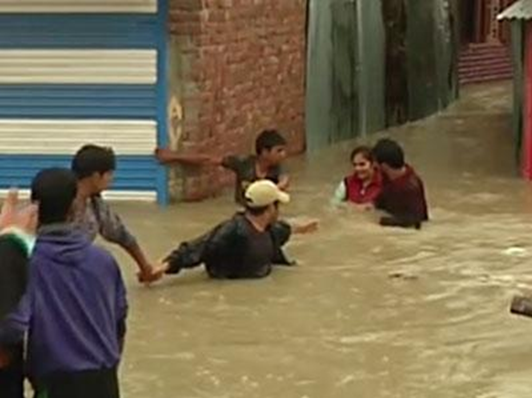Kashmiri Students Rush Back from Delhi to Help in the Floods
Young Kashmiris rescue residents;

NEW DELHI: It was unexpected. Kashmir has not witnessed such widespread mayhem caused by floods in the last century. One could not even imagine ten breaches in a day in the embankment of river Jhelum.
Sidra Kabir, a resident of Wazir Bagh in Srinagar who was rescued by local volunteers, recalls the night before the water inundated her house. “Initially, we did not take the warning calls seriously. We were naïve to think that our house won’t be affected. The keyhole in the door was like a water tap. I tried to stop water by blocking the holes with pillows and whatever I could, but water levels started rising too quickly. Gushing water changed its direction and two floors of our house got submerged.”
Wazir bagh is one of the badly affected areas along with Jawaharnagar and Rajbagh. Although many people were rescued on the first day, Sidra and her family had to wait for three long days to be rescued. “My phone stopped working around 5pm that day, I called people for help before that. But nobody could help us.”
Rescue teams airlifted her neighbours as she watched from her house. “The helicopter could not rescue my family because we couldn’t stand on the roof, as our house has a closed roof top”, she said.
She was rescued three days later by a group of local volunteers in a rafting boat. But her father is still in the house as he fears theft after the waters recede. “My father is still in the house and I am worried for him, but he is worried about theft.”
While people are being rescued, animals are dying without food. “I saw animals dying. Dogs, cattle who died due to suffocation and lack of food were floating while we were being rescued” says Burhan Sharief, a shopkeeper who was rescued five days after his shop was hit by floods in Shaheedgunj area of Srinagar.
Carcasses have become a huge concern. In the aftermath of floods, cholera and other water borne diseases can be more lethal than the disaster itself. “First priority now is the disposal of dead animals to prevent disease. Any volunteers?” posted Naeem Akhtar, the chief spokesperson of the principal opposition Peoples Democratic Party.
State chief minister Omar Abdullah and the state government have come under strong criticism for their absence from the ground. “Nothing could have prepared me for what I saw as we flew over Srinagar with the PM. I can remember looking out of the window as the plane did a low circuit over the city, absolutely dumbfounded” Abdullah wrote in his column in the Indian Express.
The Chief Minister is being virtually ridiculed by the residents. “One big relief measure Omar Abdullah could take is to hand over governance to someone else, anybody from his party, his Sonwar Halqa president, his PSO, his jamadar, Mohammad Sultan, his barber or maali. Anyone. That would make a great difference.” Naeem Akhtar said in a social media post.
Imaad Mir, a student of law in Delhi who rushed back to Kashmir to rescue his parents, concurred.“I called helpline numbers, volunteers but nobody knew about my father.” His father, Rafi Ahmad Mir, who is the Member of the legislative assembly from Pahalgam in Kashmir was rescued only after Imaad initiated his rescue with a group of local volunteers. I carried my mother out of the waters, she has a knee problem. I was worried about her.”
In Delhi’s C.R Park Sabreen Haziq received information about her grandmother after waiting for six days. Situation at her home is a little better as compared to the grim and uncertainty that followed the floods. “My grandmother is in her seventies, she was alone, and we had no clue about her whereabouts. We tried every possible means to contact her but nothing worked.” The grief torn valley saw mayhem and confusion due to loss of mobile phone connectivity. Although people used social networking sites to update rescue lists and to coordinate relief work.
Relief work has begun in and outside Kashmir. Suvaid Yaseen is one among many who are coordinating the collection of relief items across Delhi. “Sterilised sheets, medical equipment, and dialysis fluid are immediately required at Ahmad’s Hospital in Nowgam. Those buying medicines can get these things and send them to JNU” wrote Suvaid on his social network account.
Fareeha Iftikhar, a student at the IIMC, has been collecting funds for relief in Delhi. Students, especially Kashmiris, across India are working extensively in small groups in order to send relief to Kashmir. Khalid Qazi, a Kashmiri working in Delhi for Microsoft is collecting relief items and getting them on flights that are leaving from Delhi to Srinagar. “This is the best possible way I can help people in distress.” says Khalid.
While a lot of relief items have been sent up to Kashmir, a proper channel to distribute them on ground is missing. “We have set up a receiving and forwarding site at Humhama base camp. It is important for everybody to know that it is not necessary to distribute the aid as soon as it reaches here. A lot of relief is getting wasted in the rush of disbursing it immediately before reaching the people in critical need.” wrote Aala Fazili a local volunteer from Humhama.
Humhama base camp has been among the first base camps in Kashmir which started working right from the first day of the devastating floods in Srinagar, catering to the needs of around over three thousand people from different areas of Srinagar.

